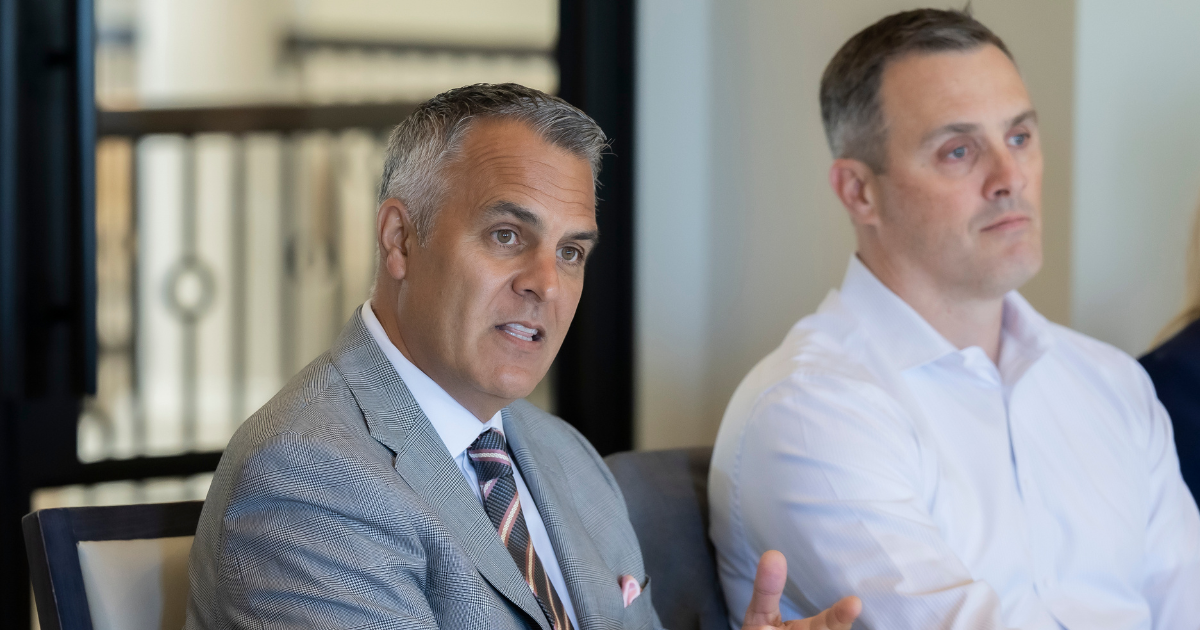Imagine a world where your company's next billion-dollar idea isn't born in a boardroom but in a laboratory, where decisions are made not on gut feelings but on cold, tangible, complex data. Where failure isn't feared but rather embraced as a stepping stone to success.
This isn't science fiction – it's the future of business strategy. And for those brave enough to adopt it, the rewards are astronomical.
Here’s the thing: in today's fast-paced, data-driven world, you can't afford not to think like a scientist.
The ability to make informed, data-driven decisions has never been more crucial. As CEO of Innventure, I've seen firsthand how applying scientific principles to business strategy can be a game-changer. But I've also witnessed the challenges that many entrepreneurs face when trying to implement this approach.
Let's face it: the business world is in a state of constant flux. According to a study by McKinsey, as reported by IMD Emeritus Professor Stéphane Garelli, the average lifespan of companies listed in the S&P 500, has dramatically decreased from 61 years in 1958 to less than 18 years today, highlighting the urgent need for continuous innovation and adaptability in the corporate world (Garelli, S., "Why You Will Probably Live Longer Than Most Big Companies," IMD, n.d.). If that doesn't scream "adapt or die," I don't know what does.
A 2019 PwC survey found that only 35% of executives consider their companies to be highly data-driven. In other words, 65% of companies are essentially flying blind. And that's a recipe for disaster in a world where AI and machine learning are reshaping entire industries overnight.
In a world of uncertainty, the scientific method gives us a framework for capitalizing on innovative opportunities.
The Current State of Business Decision-Making
Despite the age of big data, many companies still make decisions based on gut feelings and untested assumptions. A 2020 NewVantage Partners survey revealed that only 37.8% of companies report creating a data-driven organization. Even more concerning, a mere 26.8% of respondents say they have succeeded in building a data culture within their firms (NewVantage Partners, 2020). These findings highlight significant challenges businesses face in translating data investments into tangible organizational change and business outcomes.
These statistics are particularly troubling given the rapid pace of technological change and market disruption we're experiencing. In this environment, the ability to make decisions based on solid data and rigorous analysis isn't just an advantage – it's a necessity for survival.
The Scientific Approach to Business
At its core, applying scientific thinking to business means adopting the scientific method: forming hypotheses, designing experiments to test them, analyzing the results objectively, and using those insights to inform future decisions. This approach can lead to more innovative products, more effective marketing strategies, and more efficient operations.
Consider the tech giant Google. Their culture of experimentation is legendary, with the company running thousands of A/B tests each year. This commitment to data-driven decision-making has been a key factor in their sustained success and innovation.
Challenges in Implementing Scientific Thinking
While implementing scientific thinking in business strategy offers numerous benefits, it's important to acknowledge the hurdles that organizations, especially startups and small businesses, often face. Here are some key challenges:
1.) Limited Resources
Startups frequently struggle with insufficient financial and human resources to conduct rigorous experiments. According to CB Insights' 2023 State of Venture Report, 38% of startups fail due to running out of cash or failing to raise new capital (CB Insights, 2023).
2.) Time Pressure
The fast-paced nature of the business world, particularly for startups, can make it challenging to dedicate time to systematic experimentation. A 2022 Startup Genome report revealed that premature scaling is responsible for up to 74% of high-growth startup failures (Startup Genome, 2022).
3.) Lack of Scientific Expertise
Not all entrepreneurs have a background in scientific methodology. A 2019 Kauffman Foundation study found that only 37% of startup founders have a STEM background (National Center for Science and Engineering Statistics, 2023).
4.) Emotional Bias
Our emotional investment in our ideas can lead to confirmation bias, hindering objective decision-making. A 2020 meta-analysis published in the Strategic Entrepreneurship Journal found that overconfidence is a prevalent trait among entrepreneurs, which can impede rational, data-driven decision-making (Zhang & Cueto, 2020).
5.) Fear of Failure
The scientific method inherently involves the possibility of failure, which can be daunting in a corporate environment. However, a 2022 study in the Strategic Entrepreneurship Journal found that entrepreneurs who view failure as a learning opportunity are 2.2 times more likely to succeed in subsequent ventures (Denoo et al., 2021).
Overcoming These Challenges
Despite these obstacles, I believe that adopting scientific thinking is not just possible, but essential for modern businesses.
Here's how we can overcome these challenges:
- Start Small: You don't need a huge budget to start experimenting. Begin with small, low-cost tests and gradually scale up as you see results.
- Cultivate a Data-Driven Culture: Encourage all team members to question assumptions and base decisions on evidence. A 2023 McKinsey Global Survey on artificial intelligence (AI) found that high-performing companies, defined as those with revenue growth of 10% or more in the past three years, are 1.6 times more likely to report using AI in standard business processes compared to other companies (Chui et al., 2023).
- Invest in Training: Provide training in basic statistical analysis and experimental design. This can help bridge the expertise gap and empower team members to think more scientifically.
- Embrace Failure: Reframe failure as a learning opportunity. Companies that embrace a "fail fast, learn fast" mentality are often more innovative and adaptable.
- Use Technology: Leverage AI and machine learning as tools to help analyze data and uncover insights. The same McKinsey survey found that 50% of organizations are already using generative AI in at least one business function (Chui et al., 2023).
From Data to Discovery
As we navigate an increasingly complex and uncertain business landscape, the ability to think scientifically will become ever more crucial. It's not just about collecting data – it's about asking the right questions, designing rigorous experiments, and being willing to follow where the evidence leads, even if it challenges our preconceptions.
But here's where I want to challenge you to think bigger. Scientific thinking in business isn't just about making better decisions or improving efficiency. It's about fundamentally reimagining what's possible.
Imagine a world where every business decision is an experiment, every customer interaction a data point, and every failure, a stepping stone to breakthrough innovation. This isn't just pie-in-the-sky thinking — it's the future of business, and it's already happening.
The companies that will dominate the next decade aren't just using data – they're living and breathing the scientific method. They're turning their entire operations into living laboratories, constantly testing, learning, and evolving. A 2023 McKinsey Global Survey found that high-performing companies are 1.6 times more likely to report using AI in standard business processes compared to other companies (Chui et al., 2023).
Remember, every great scientific discovery started with a simple question: "What if?" It's time we start asking that question more often in business. Because in a world of unprecedented change and opportunity, the most dangerous thing we can do is to stop questioning, stop experimenting, stop learning.
So, I challenge you: Don't just adopt scientific thinking as a tool. Embrace it as a philosophy. Let it permeate every aspect of your business. Be bold in your hypotheses, rigorous in your experiments, and fearless in following the data – wherever it may lead.
The future belongs to the scientific thinkers, the data-driven dreamers, the entrepreneurs who aren't afraid to put their assumptions to the test.
Will you be one of them?
Let's revolutionize business strategy together, one hypothesis at a time. From pandemic preparedness to AI-driven innovation, the opportunities are vast. The laboratory of the future is open for business – are you ready to get to work?
Bill Haskell is the CEO of Innventure, bringing over 30 years of experience in building and scaling technology companies across diverse sectors. A seasoned entrepreneur and executive, Bill has served as CEO, COO, and strategic planning executive for numerous ventures, and has been a director for more than a dozen public and private companies globally. His expertise spans company building, financial modeling, M&A advisory, and taking companies public through IPOs. Bill's unique approach combines deep industry knowledge with a talent for assembling high-performing teams, making him a sought-after leader in the world of corporate innovation and technology commercialization.Ready to revolutionize your approach to innovation and talent management?
Contact us today to learn about Innventure’s innovative approach to company creation.
.png)





